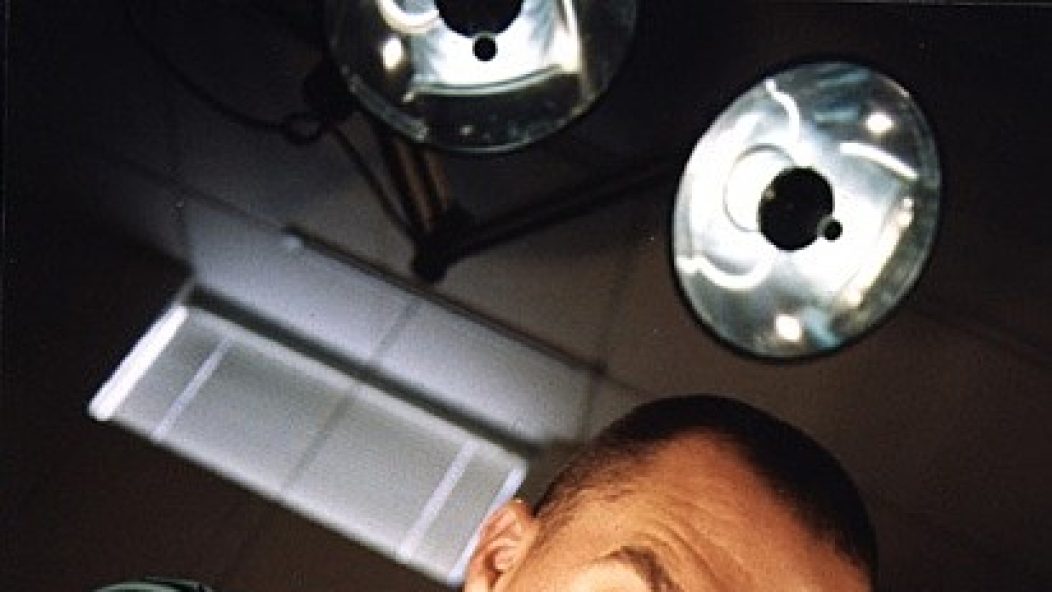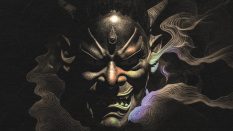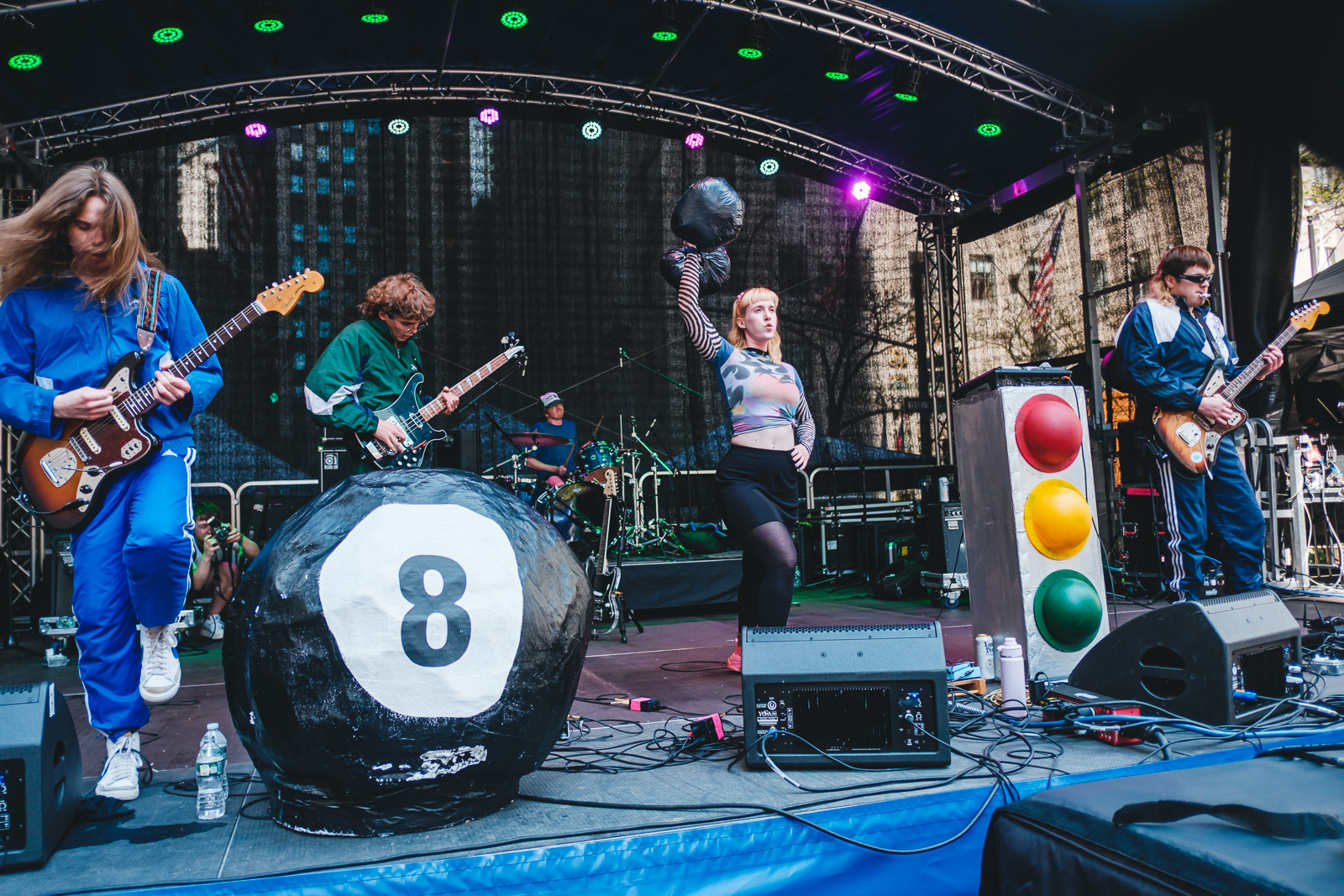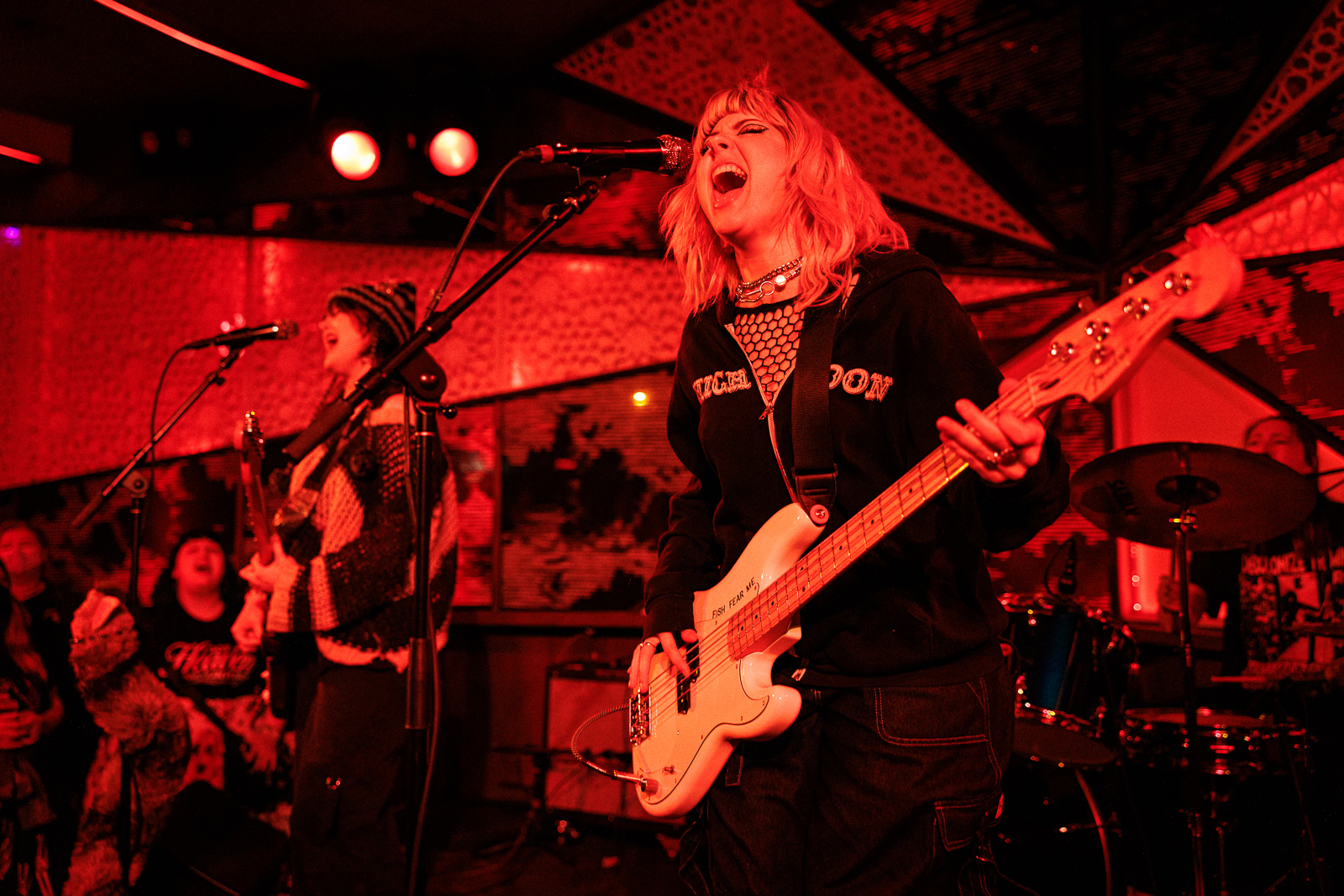
Finding Andrew LaBarre
…
When I meet with Andrew LaBarre at Ale Industries in East Oakland, I’m nervous. This is the first time that anyone in our little Bay Area metal scene has seen him in years, and I have questions that I need answered.
“Why did you disappear?”
“Why would you give it all up?”
“Are you happy?”
I’m curious, but more than anything I’m anxious. I’m anxious because when I see Andrew LaBarre, I see a vision of my future. And I don’t know if that is a good thing.
Since joining the progressive black metal band Wild Hunt on bass last year, I’ve gone on four weekend runs up and down the West Coast, played Northwest Terror Fest and participated in a new album release. My moonlit lives as a journalist and an audio engineer unexpectedly came in handy with this new role: I helped pull our last record out of mixing hell, contributed copy to the subsequent PR campaign, and recorded and cataloged endless practices as we wrote new material, along with a myriad of other tasks. On most days of the week I flexed my muscles as a musician, engineer and writer, and the reward was a kind of heavy metal ambrosia. For that year, the choices and efforts I made during my youth were validated.
Then my bandmates disappeared. They spent the summer touring with their other acts, and threw in a few vacations and trips while they were at it. For about three months, I lost my three closest friends and the activity that had made me so happy over the past year. With my beloved routine not just gone but forcibly yanked away, my brain quickly lost its grip on reality. My mood swung about like a disturbed pendulum, I woke up screaming as I saw demons in my room, imaginary voices mocked me over the conference phone at work and I binge-watched New Girl on Netflix. This summer my mind plunged into a bottomless pit of frustration, resentment and ultimately, plain-old sadness. My life for the past several years had been defined by my intense involvement with metal and for the most part, my connection to that world was now gone.
…
…
Some time ago, I had heard of Andrew LaBarre. As a former guitarist for Impaled and a one-time freelance engineer, his name made fairly regular occurrences among friends not just here in Oakland, but all across the West Coast. They’d praise his work with that band as well as Prevail, Altar the Sky, and Ghoul, describe him as an absolute shredder and compliment his recording ability while they were at it. Nearly 10 years ago, he practically disappeared overnight from the scene. He hadn’t even turned 30 yet. As far as I knew, he dove headfirst into that metal-free wormhole a decade ago and no one had checked in on him since.
“Why would he throw that life away?”
“Can he have it back?”
“Does he even want it back?”
As my summer descended further into madness and confusion, I needed resolutions. I needed to know if I had hope of crawling out of my chasm: with or without my band, or even with or without metal. I needed to find out what happened to Andrew LaBarre.
Lucky for me, his former bandmate Raul Varela saved his number after all these years. We chat on the phone, bizarrely bump into each other on the street and agree to meet on a Saturday afternoon near his newly purchased home. When we rendezvous at Ale Industries, I size-up the Andrew LaBarre of 2018. I note his worn At the Gates shirt, his greying and curly hair, a layer of stubble, and his numerous tattoos. The person sitting across from me is a far cry from the clean-cut, tensely-wound youngster in scrubs pictured inside the booklet of Impaled’s Mondo Medicale. This man instead carries a friendly, yet relaxed energy: he kindly bought me my beer, inquisitively asks about my background, and an easy smile never leaves his face. LaBarre sips on his root beer and he tells me how it all began.
“I’ve always had incredible passions for things. I was a junior tennis player, like a real successful junior tennis player and got burned out really young. And then right after that, so I was like 13… I went from the tennis world to not wanting to have anything to do with being cool or popular. I found Metallica and it was like The Black Album at that time,” LaBarre remembers. “I just became completely obsessed, and very shortly after I started learning how to play guitar because I wanted to learn how to play songs that I heard, you know? So what really got me into the genre that I started trying to emulate… I saw Dissection, At the Gates, and Morbid Angel in San Francisco. It was the best show I’ve ever… like seriously, I’ve never been to a better show and it completely changed my life.”
…
LaBarre tells me about his high school days, when he built his skills as a guitarist with an act called Sovereign State. Then he stuck his nose in the books. He studied music and recording at Sonoma State University, took lessons on the side from James Murphy of Death and befriended fellow metalheads like Marcus Luscombe, who now plays in Cormorant as their bassist and vocalist.
“Andrew was one of the only other serious guitar players in the dorms, the only one as far as I was concerned. Neither of us had bands but we started jamming as our schedules allowed, even working up some jams that we jokingly had planned to debut at a talent show in the dining hall to win pizza money,” Luscombe remembers. “I was immediately dazzled with his lightning-fast chops and harmonic depth, he had ‘that sound’ that I was striving for and made it look effortless. Andrew was certainly an inspiration and for lack of a better term, a ‘guitar hero.’ Seeing talent up-close at that critical stage in development had a huge impact and I appreciate all the musical knowledge he imparted. Sadly, over the years we drifted out of contact… but I still revere him to be one of the most talented metal guitarists in the Bay Area.”
LaBarre began to make a name for himself as the guitarist for Prevail, which was made up of former members of Sovereign State and his friends from college. Thoroughly inspired by Dissection and At the Gates at the heights of their powers, Prevail condensed their styles into 9 warp-speed bursts of melodic extreme metal on their only release, It Takes a Whole Lot of Work, It Takes a Whole Lot of Time. The short and hooky tracks are an open love letter to the bands that LaBarre and his cohorts worshiped growing up, and a precursor to the metalcore movement that swept Hot Topics across the country throughout the 2000s.
…
…
“Danny, the drummer of Prevail, and I wrote most of the Prevail songs together,” LaBarre explains. “Our formula tended to be Danny writing an aggressive verse, and me writing a more melodic chorus. Also, Danny had a profound impact on my songwriting, as he would easily pick out influences in my riffs — he’d say, ‘That sounds too much like Kreator.’ He helped me become more original in my songwriting, which was probably most noticeable on the Altar The Sky album.”
It Takes a Whole Lot of Work… was the first of several albums that LaBarre engineered himself — he’d also record the likes of Vengince and Hacksaw to the Throat — and it began a pattern of performing multiple roles in a single band. For a few years Prevail and LaBarre impressed their older peers in the local scene (Aesop Dekker of Ludicra was an immediate fan and retrospectively covered their full-length at The Cosmic Hearse), but the guitarist’s time in the band wouldn’t last.
“I was losing interest in it and I wanted to play more kind of death metal and black metal stuff then. I just wasn’t into it,” LaBarre admits. “I was the one that set up most of the shows and did a lot of tape trading with people all over the place. And when I kinda stopped and lost interest in that, I don’t think there was any way for that momentum to continue… When we were sharing the [rehearsal] studio with Impaled I always, kind of in the back of my mind, had this idea that I wanted to play with them. When that opportunity presented itself, that was really the thing that just cemented [Prevail] being done.”
From sharing that rehearsal space at Soundwave Studio in Oakland, LaBarre found himself working with Impaled’s guitarist Sean McGrath on several projects. The first was Black Ops: an impromptu collaboration between McGrath, his Impaled bandmates Raul Varela and Leon del Muerte, and Henke Forss from Dawn, with LaBarre handling the engineering duties.
…
…
“I had already recorded Black Ops, so Sean knew I had recording gear… and right around maybe summer 2001, I recorded four songs for Impaled that were gonna come on their next album,” LaBarre remembers. “And that’s when I really knew I wanted to be in the band because I really fucking liked the songs.”
LaBarre recalls that McGrath had other plans for him at the time. McGrath envisioned a Creepsylvanian thrash band called Ghoul and recruited LaBarre to render his idea as a demo. McGrath being pleased with the results, the two collaborated further on Ghoul’s first full-length We Came for the Dead!!! with LaBarre engineering the record, and lending additional vocals and guitar solos.
“[McGrath] approached me with this Ghoul idea thing. And there’s actually a demo before We Came for the Dead!!! where I played drums on it. He wanted me to play drums on the first [album]… he was actually happy with my playing on [the demo] and I wasn’t at all. He got Raul [Varela] to play drums, Sean did all the guitar and bass work, and then the leads were the two of us doing leads… there’s some songs where Sean’s doing the deep vocals and some where I am. I believe that was sort of my audition in a sense, you know?” LaBarre ponders. “It was around that time… fall of 2001, when they asked me to join Impaled.”
…
…
“He played some solos and did some vocals on that first Ghoul record and I was super impressed with his playing. He just wrote these killer Marty Friedman-esque leads off the top of his head. Extremely catchy and tasteful,” Sean McGrath says of his former collaborator today. “When Leon was kicked out of Impaled — sorry, Leon — Andrew was pretty much the only person I had in mind to ask. I don’t know if we even tried anyone else out. When he joined I really thought of him as our secret weapon, because he was not only great at leads but he was a really good songwriter as well, which is not always the case with shredders. The fact that he knew something about recording was a bonus, since the rest of us didn’t have a ton of first-hand sound engineering experience.”
With LaBarre replacing a then-departed del Muerte, Impaled immediately began work on their second record and his senior-year recording project at Sonoma State, Mondo Medicale. His penchant for scheduling, control and organization brought a newfound focus to Impaled — the result was one of their sharpest releases and a death metal classic: an album that showcased their mastery of an intersection of death metal and technical thrash. LaBarre’s knack for hooky songwriting was on full display, with songs like “Raise the Stakes” marrying Impaled’s riff gumbo with his high-speed legato solos and melodic bent.
…
https://www.youtube.com/watch?v=5gK8QSuGQcU
…
“It was super focused, intense, and I think I was obviously the taskmaster,” he says of Mondo Medicale. “That’s how I’ve always been in bands, and probably to a point where it’s not cool, you know? Really, I look back on that like, ‘Oh, I wish I had been a little more laid back.’ Because I just wanted to constantly do everything over. And they’re pretty relaxed, chill guys, and I was never happy with anything. I always wanted it to be better, better, and tighter, tighter. And I think you can hear that on that recording. When I would drive to practice I would spend the entire drive just singing and doing that. And any chance I could get I was just practicing because I knew I had to get better.”
The foursome toured in support of Mondo Medicale across the country with Incantation, Decapitated, Vehemence and Dead to Fall, but the road wore LaBarre down. Music had given him an outlet for performing and writing, but now it demanded a tax. Though he attempted to quell his growing anxiety by taking the wheel nearly every night of tour, it was an obstacle that refused to make way. After the tour Impaled reconvened to write and record material for a split with Haemorrhage called Dementia Rex, and McGrath and LaBarre worked on the side to assemble the second Ghoul LP Maniaxe. But by then, LaBarre’s short stint as a touring musician had already come to a close.
“Sean and I, we rented a van… We drove from California to the Milwaukee Metalfest in 48 hours straight without stopping, because that was our deadline. You know, like, where you get so sleep deprived that you’re hearing things? Because I remember answering things that he hadn’t said,” LaBarre recalls. “That was the beginning of the end for me because I knew I wasn’t gonna be able to… I have bad anxiety problems with traveling. So I got through that but it was a very traumatizing experience for me. I’m proud of myself for having done that.”
“It was definitely no rest, no sleep, and that’s how that whole tour was, and I guess that’s just how touring is for most people, right? I liked the freedom part of just doing whatever you want when you’re on tour, but I just had severe travel anxiety that wasn’t getting better. I thought that if I did [the tour] I would get over that fear a bit, but when we got back it was actually worse. It wasn’t better,” he laments. “The next summer there was talk of us going to Europe and I was starting to freak out because there was no way I was gonna be able to get on a plane and do all that. And kind of the end of it was… there was a festival way far away and I just couldn’t do the travel anymore. It’s kinda lame, it had nothing to do with music and I really wanted to keep playing music.”
The turmoil that LaBarre went through at the end of his time in Impaled took form on his solo project Altar the Sky, whose only release was Plight of the Vomit Eagle. With LaBarre playing every instrument in addition to recording the album himself, the album demanded the most of his abilities as a musician, engineer and writer. His signature Dissection-esque grooves alternate with frosty and dissonant torrents, and the proceedings are laced with his avian shrieks. The record’s red-eyed energy, LaBarre’s relentless axework and his newfound use of atmosphere coalesce in the 10-minute epic “Aircrash.” The track descends from barrel-chested leads into buzzing chaos, where LaBarre’s blastbeats are all that anchor the noise to anything resembling order and reason.
…
…
LaBarre’s solo project showed his influences and abilities boiling over, but it was also a stark reflection of his non-musical traits. His taskmaster tendencies, the anxiety brought on by touring and his intense perfectionism all dictated the need for Altar the Sky to be a solitary effort. LaBarre loses his words when attempting to describe Plight of the Vomit Eagle to me, with his tone morphing from nostalgic to vulnerable.
“It’s hard to talk… I can’t listen to that,” LaBarre says. “It’s hard for me to listen to it. I get real… I don’t know. I get very kinda… it’s sad and… it’s not uplifting in any way, those songs. And when I think about what I was going through at that time, maybe it’s very obvious with the music — especially the stuff that gets a little more trippy where there’s lots of guitars going on that are really ugly sounding. There’s some solos where I’m not even trying to do anything melodic, and that’s kind of a warning sign in a sense of something not really… you know what I mean? I probably wasn’t aware of that while I was doing it, but that was definitely coming out.”
“There was so much freedom and I could just play whatever I wanted… I was happy to do it just like that, and I had 100% control over everything,” he says. “I don’t know if you have this issue as a recording person, but it’s very hard for me to be content with other people’s performances. I can always find something that I want them to improve. And then also the touring part. I was thinking, ‘God, if this turns into a band thing I’m gonna have the same thing happen down the road.’”
Plight of the Vomit Eagle remains LaBarre’s last publically available work. Despite pursuing a death n’ roll project in 2007 called Addiction King with his former bandmate Raul Varela, the band didn’t make it beyond a demo and one show. LaBarre then vanished from the bay’s metal scene, which continued to thrive in his absence.
“We did a demo and then that was pretty much that. So that was over 10 years ago,” LaBarre remembers. “Yeah, so that’s pretty much the last thing since then.”
“So what prompted you to put music aside then?” I ask.
“Well, I got super into bicycling,” he says.
Andrew LaBarre finally gives me the answer I sought. He spent his career drifting from melodic death metal to thrashy death metal to technical black metal to death n’ roll, but found a new passion entirely: his bike.
“I just got super into competitive bike racing and that’s just how I am. It’s one thing, full focus, and I don’t have a variety of hobbies, it’s just one thing that I do,” LaBarre openly admits. “So with the music… I was just in a weird place where I didn’t know what I wanted to play. I lost some sort of creative spark thing that now just comes randomly. I still come up with riffs but it’s not… I don’t have the edge that I had back then. There was an edge where my whole life was playing guitar and writing music. That’s all I did, really.”
“Once I got into my mid-20s, I wasn’t in a band anymore and I didn’t really see the point of doing it for myself,” he says. “I just kinda felt like there’s no reason to play guitar six hours a day if I’m just gonna be doing it in my room for myself, you know? I’m not playing for anyone, so yeah, I just found kind of a new hobby.”
Since making his exit from the Bay Area metal world, shredding is no longer a part of LaBarre’s life. Though he indulged in occasional get-togethers with his old friends in Prevail, virtuosic guitar playing firmly took a backseat. The Marty Friedman-esque leads that Sean McGrath once praised became a thing of the past.
“If you’re into technical stuff and you don’t keep it up, you lose it,” LaBarre warns me. “My left hand has lost it more than my right hand. My right hand, I can still downpick pretty fast and it’s still very accurate but my left hand, I just don’t… I don’t have the legato I used to have. I’d have to put a lot of work in to get back to that point.”
His tone is frank, but it lacks dejection or sadness. LaBarre has little reason to miss his high-velocity fret wizardry when his guitar pays other dividends today. A decade ago he decided to no longer woodshed simply for himself. But soon after, he found a doting audience that now comes to watch him play every single day.
“I didn’t stop playing but definitely don’t play at the same level as I did. But it’s come in handy. I’m a teacher and I teach third grade kids, and I play guitar every day in my class. I teach kids songs because it’s a fun thing to do, and they get to hear little bits of, like, ‘Angel of Death,’ and I’ll play that on an acoustic guitar. I don’t tell them what the song is called but they’re definitely exposed to way more music than any other class that I know of,” he says with a laugh.
…

…
Before meeting LaBarre in-person, I thought of his story as an unholy fall from grace. I played make-believe with his life, imagining my summer misery extended across a decade — his decade. But LaBarre’s actual journey turned out to be better than that. Music gave him so much while also putting him through hell, so he took control. The travel, the checklists and the imperfections no longer exist in his life as a guitar player. He threw away the elements that weren’t sustainable, and cultivated a connection to metal that felt right. The day LaBarre left the metal world, he escaped the black hole and found the balance he needed. Our vortices pulled us in different directions; his method of escape is not my own, and our places of darkness even lack resemblance. LaBarre pedaled his way out to an elementary school in Alameda, while my path out of the abyss remains unilluminated.
Wild Hunt reconvened for regular practices recently and unsurprisingly, my mind didn’t mend overnight. LaBarre gave me the answers I asked for and the band returned to my life, and yet I still felt the tumult and the terror. Being the jack-of-all-trades bass player once gave me purpose, but I had to accept that it only lasted for that year of my life. That was the relationship with music that felt right then and I have yet to discover the metallic bond that will make me happy once again. I’m hopeful that it’s out there, and I’m prepared to stake my claim when it presents itself. Until then I remain open to the possibilities.
“All the old stuff that I listened to when I was a teenager, like old Deicide, Morbid Angel, Dissection, At the Gates, I mean, [I listen to] literally the same stuff I listened to back then… It’s definitely still in my life. It’s just like where I am… I’m almost 40, I’m 39. I just listened to Once Upon the Cross by Deicide like, yesterday. And as I get older… You’ll see this if you keep listening to metal long enough, it’ll have different meaning to you at different times in your life,” Andrew LaBarre said to me as we ended our chat. “When I first heard that stuff I was afraid of it, and that’s what attracted me to it. Death metal, it was terrifying. Hearing Morbid Angel when you’re 14 is very, very scary. I listen to it from a very different perspective now. I just feel like I hear it from a different angle than I used to.”
…
Support Invisible Oranges on Patreon.
…











